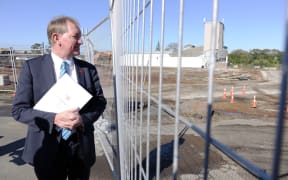Local councils have unveiled a blueprint for the future, calling for the right to tax tourists, charge motorists and claim a share of royalties from minerals in their regions.

Lawrence Yule Photo: LGNZ
They say ratepayers want more from councils but income from rates is not keeping up with demand.
President of Local Government New Zealand Lawrence Yule said councils were facing unprecedented economic change coupled with growing demands from the community and central government.
He said the new plan would help tackle key issues such as economic development, population shifts, climate change and technological advances.
Mr Yule said while property rates would remain the cornerstone of local government funding, it needed a wider set of funding sources.
Suggestions included introducing road user charges, regional fuel and tourist taxes and a share of royalties from natural resource extraction.
Mr Yule said tourists should foot more of the bill for providing services for them.
''We have considered bed taxes in the past, we're not saying we should have that, there's a lot of opposition to that, but it's widely used overseas.
"We're just simply saying that if there is mechanism that is available in terms of tourist tax to more fairly share the costs of providing the infrastructure, that needs to be considered."
Mr Yule said councils also wanted the Government to pay rates on Crown-owned land.
Wellington's deputy mayor Justin Lester said the call to make the Government pay rates on Crown-owned land was mostly to aid regional councils.
He said some regional councils had large segments of conservation land they could not charge rates on nor develop.
But Mr Lester said they had to provide access to them, along with facilities, which placed a significant burden on their small rate-paying bases.
However Prime Minister John Key said although he could not say that the Government would never pay rates on Crown-owned land, he did not expect there to be any change soon to the status quo.
He acknowledged that the rate exemption was a long standing issue, but said it had been introduced for historical reasons.
Mr Key said the Government was aware of the work local government had been doing in this area but there had been no suggestion that central government plans a change anytime soon.
Local Government Minister Paula Bennett said councils needed to look at getting best use for ratepayer dollars before they started looking at revenue gathering from other sources.
While the minister said she had some sympathy for councils needing to diversify funding she said it would be important that they also look at ways to make savings and achieve efficiencies before moving to rate facilities like schools that exist on Crown land.
"So should we take money out of the school to ensure that we're putting it into the council's hands, to then, presumably, be putting that money back into the community?
"It's a bigger discussion than saying all Crown land should just pay rates."
LGNZ is advocating for the following key proposals:
- An agreed priority and action plan to advance "special zones" for growth to test new
- When new centrally imposed costs are considered (and particularly where national
- Mandatory rating exemptions should be removed.
- The application and administration process of the rates rebate scheme should be
- Better guidance is needed to assist councils make decisions on trade-offs about whether
- Road user charges, targeted levies and fuel taxes should be allowed where it is
- Councils should be able to retain a share of any value uplift arising from additional
- Local authorities should receive a proportion of any mineral royalties attributed to local
- Allow councils to levy specific charges and taxes on visitors where economically efficient.
- Reconsider the decision to limit the range of community amenities funded through
ideas and drive economic prosperity.
benefit applies) a cost benefit analysis and agreed cost sharing with central government
should be mandatory.
simplified to increase uptake.
to fund services from prices (user charges) or taxes.
economically efficient.
economic activity related to local intervention and investment.
activities.
development contributions.



